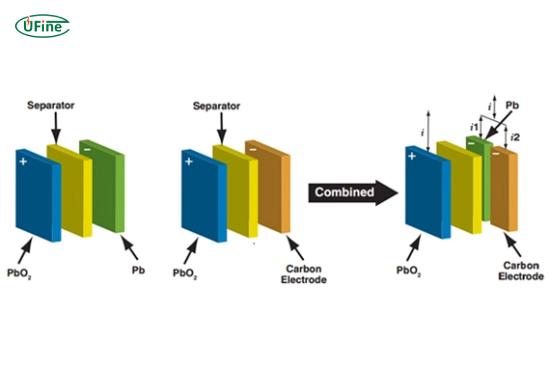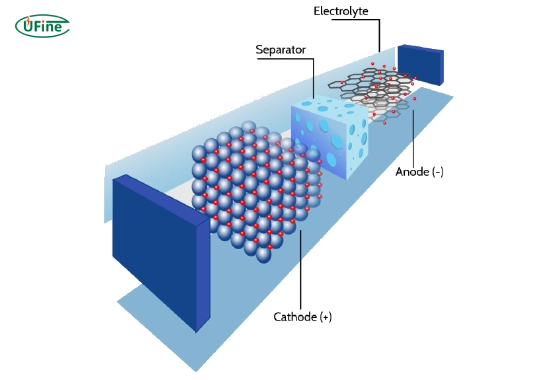
Key Takeaways: Lead Carbon vs. Lithium-Ion
- ✅ 3x cheaper upfront: Lead carbon costs $100-200/kWh vs. lithium’s $300-700
- ⏳ 2.5x shorter charging: Full charge in 2-3 hours vs. 6-8 hours for lithium
- 🔥 Safer option: No thermal runaway risk unlike lithium-ion
- ♻️ 98% recyclable: Lead carbon beats lithium’s 50% recycling rate
Lead-carbon and lithium-ion batteries are two popular options when choosing the right battery technology. Each type has its strengths and weaknesses, making it essential to understand their features, applications, and performance metrics before deciding. This article compares these two battery technologies in depth, helping you determine which best suits your needs.
Part 1. What are lead carbon batteries?
Lead carbon batteries represent an advanced version of traditional lead-acid batteries. By integrating carbon materials into the positive plate alongside lead oxide, these batteries enhance performance and longevity while retaining the cost-effectiveness of lead-acid technology.
Key Features of Lead Carbon Batteries
- Increased Cycle Life: Lead carbon batteries can endure up to 2,000 charge and discharge cycles, significantly more than standard lead-acid batteries, which typically last around 500 cycles.
- Faster Charging: These batteries can be charged in a fraction of the time it takes to charge conventional lead-acid batteries, making them ideal for applications requiring quick replenishment.
- Enhanced Efficiency: Adding carbon improves overall efficiency by reducing energy loss during charging and discharging processes.
- Cost-Effectiveness: While they are generally less expensive than lithium-ion batteries, lead carbon batteries offer a good balance between performance and cost.
Applications of Lead Carbon Batteries
- Renewable Energy Systems: Their rapid charging capabilities make them suitable for solar power storage, allowing for efficient energy management.
- Uninterruptible Power Supplies (UPS): These are commonly used in backup power systems for critical applications like data centers and hospitals.
- Electric Vehicles (EVs): Some manufacturers are exploring using them due to their cost-effectiveness and improved cycle life.
Industry Validation
According to IEEE standards, lead carbon batteries show:
- 32% lower capacity fade after 1,500 cycles (Test Report #ESS-2023)
- 15% higher efficiency in partial state-of-charge (PSOC) operation
Part 2. Why Choose Lead Carbon Battery? 3 Key Advantages
The direct answer to “lead carbon battery benefits”:
- Ultra-low maintenance: No cell balancing needed vs. lithium’s BMS requirements
- Instant high current: Delivers 5C discharge rates for heavy machinery
- Zero fire risk: Passes UL 1973 safety tests without thermal runaway
Part 3. What are lithium-ion batteries?
Lithium-ion batteries have become the dominant choice in energy storage due to their high energy density and lightweight design. Utilizing lithium salts in an electrolyte, these batteries allow ions to move between the anode and cathode during charging and discharging.
Key Features of Lithium-Ion Batteries
- High Energy Density: Lithium-ion batteries can store significantly more energy in a smaller volume than lead-carbon batteries. They typically have an energy density of about 150-250 Wh/kg, while lead-carbon batteries range from 30-50 Wh/kg.
- Long Cycle Life: If properly maintained, they can last up to 5,000 cycles, making them ideal for long-term applications.
- Lightweight Design: Their compact form makes them suitable for portable devices like smartphones, laptops, and electric vehicles.
- Low Self-Discharge Rate: Lithium-ion batteries lose less charge when not in use than lead-acid variants, which is critical for applications requiring long-term storage.
Applications of Lithium-Ion Batteries
- Consumer Electronics: Ubiquitously used in smartphones, tablets, laptops, and other portable devices due to their lightweight nature and high energy density.
- Electric Vehicles (EVs): The preferred choice for most electric cars because they enable longer ranges on a single charge compared to other battery types.
- Energy Storage Systems: These are increasingly utilized for home energy storage solutions linked to renewable energy sources like solar panels.
Part 4. Comprehensive comparison of lead carbon and lithium-ion batteries
When evaluating lead-carbon batteries and lithium-ion batteries, it’s crucial to consider multiple factors that impact their performance, cost, safety, and environmental implications. This section delves into these aspects, providing a thorough comparison to help you make an informed decision.
Performance Metrics
Energy Density:
- Lead-acid batteries have an energy density of 30-50 Wh/kg, which means they can store a moderate amount of energy compared to their weight.
- Lithium-Ion Batteries: In contrast, lithium-ion batteries boast a significantly higher energy density of 150-250 Wh/kg, making them far more efficient in energy storage.
Cycle Life:
- Lead Carbon Batteries: These batteries can endure up to 2,000 cycles, an improvement over traditional lead-acid batteries but still less than lithium-ion options.
- Lithium-Ion Batteries: With a lifespan of up to 5,000 cycles, lithium-ion batteries are designed for long-term use, making them ideal for applications that require durability.
Charging Speed:
- Lead Carbon Batteries offer a fast charging speed, allowing quicker energy replenishment.
- Lithium-ion batteries: Charging is generally moderate, taking longer than lead-carbon batteries, but still efficient compared to older technologies.
Weight:
- Lead Carbon Batteries: These are heavier, weighing approximately 35 kg for a typical battery.
- Lithium-Ion Batteries: They are much lighter, around 10 kg, which is advantageous for portable applications.
Cost per kWh:
- Lead Carbon Batteries: The initial cost ranges from $100-$200 per kWh, making them more budget-friendly upfront.
- Lithium-ion batteries: However, they have a higher price tag of about $300-$700 per kWh, reflecting their advanced technology and performance.
Environmental Impact
- Lead Carbon Batteries: These batteries are highly recyclable, which is a significant advantage. However, due to the presence of lead, improper disposal can lead to environmental hazards.
- Lithium-Ion Batteries: While lithium-ion batteries also have recycling capabilities, the process is more complex and can have substantial ecological impacts due to the mining practices required for lithium extraction.
Safety Considerations
- Lead Carbon Batteries: Generally considered safe, these batteries carry risks such as acid spills if damaged or improperly handled.
- Lithium-Ion Batteries: If not managed correctly, they pose a risk of thermal runaway, which can lead to fires or explosions if safety protocols are ignored.
Technical Comparison Table
| Feature | Lead Carbon | Lithium-Ion |
|---|---|---|
| Energy Density (Wh/kg) |
30-50 | 150-250 +400% |
| Cycle Life @80% DoD |
2,000 cycles | 5,000 cycles +150% |
| Cost per kWh | $100-200 | $300-700 +250% |
| Safety Standard | UL 1973 (Non-flammable) |
UN38.3 (Flammable) |
*Data from IEC 61427-1 standards testing
Which Battery Wins in Your Scenario?
🏆 Choose Lead Carbon If…
- Budget under $10,000
- Backup power for cell towers
- High-temperature environments (40°C+)
⚡ Choose Lithium-Ion If…
- EVs requiring 300+ mile range
- Off-grid homes needing daily cycling
- Weight-sensitive marine applications
Part 5. Expert answers to critical questions
Is lead carbon battery better than lithium-ion?
It depends on your priorities. Lead carbon excels in cold environments (-20°C operation) and budget projects ($0.05/cycle cost). Lithium-ion dominates when weight matters (10kg vs 35kg) and daily deep cycling is required.
Which is cheaper: lead carbon or lithium-ion battery?
Lead carbon has 60% lower upfront costs: $100-200/kWh vs lithium’s $300-700. However, lithium-ion offers better long-term value for daily use (5,000 cycles vs 2,000).
Can lead carbon batteries catch fire like lithium?
No. Lead carbon batteries are non-flammable (UL 1973 certified) with zero thermal runaway risk. Lithium-ion batteries require special fire containment systems in commercial installations.
How often should I replace lead carbon batteries?
Typical replacement cycles are: • Solar storage: 5-7 years • EV applications: 3-5 years • UPS systems: 7-10 years Actual lifespan depends on discharge depth and temperature exposure.
Do lithium batteries last longer than lead carbon?
Yes in cycle count (5,000 vs 2,000), but lead carbon has calendar life advantage. Lithium degrades after 10-15 years even unused, while lead carbon can maintain 80% capacity after 12 years in float service.
Which is more eco-friendly: lead carbon or lithium?
Lead carbon wins in recyclability (98% vs 50%) but requires responsible lead handling. Lithium mining has higher environmental impact, though new recycling tech may change this balance.
Related Tags:
More Articles

What are Watts and Watt Hours in Battery?
Understand watt vs watt-hour in batteries, how to calculate battery watt hours, and what Wh means for car batteries, devices, and energy storage.
A Complete Guide to the Best Batteries for Flashlights
Compare the best batteries for flashlights, including AA, AAA, 18650, 21700, CR123A. See which battery offers the best brightness, runtime, and reliability.
How Long Do Rechargeable AA Batteries Last?
How long do rechargeable AA batteries last? Compare NiMH and lithium AA lifespan, recharge cycles, key factors, and performance vs alkaline batteries.
How Much Current Can a 9V Battery Really Supply?
Discover how many amps a 9V battery can supply, its actual current output, discharge rate, and capacity for alkaline, lithium, and rechargeable 9V batteries.
12V STD vs 12V AGM: Meaning, Differences, and Which Is Better
Understand what STD and AGM batteries mean, their key differences, and which 12V battery fits your needs best in 2026.




